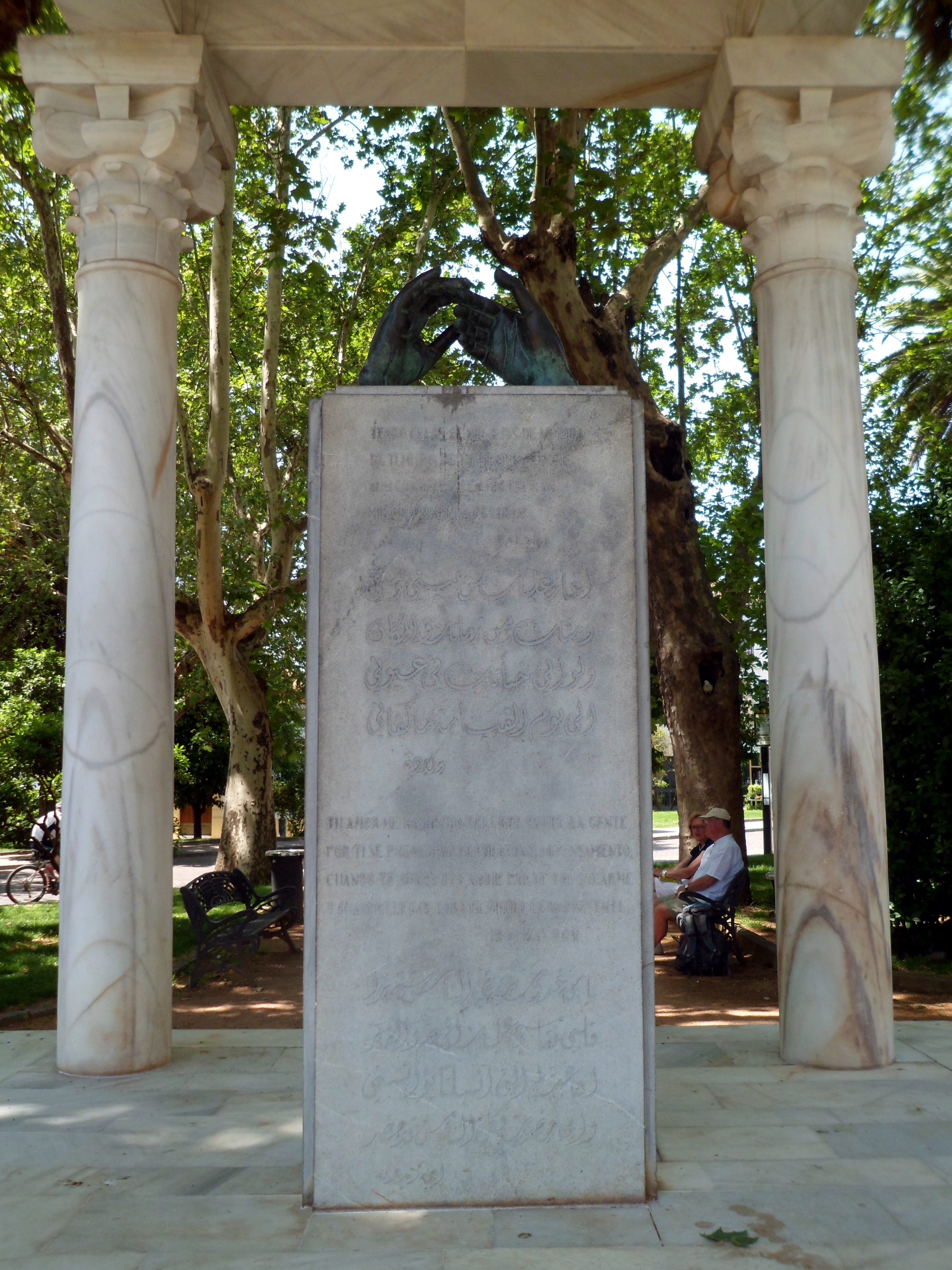Ibn Zaydun on:
[Wikipedia]
[Google]
[Amazon]
Abū al-Walīd Aḥmad Ibn Zaydouni al-Makhzūmī (; 1003–1071), or simply known as Ibn Zaydoun () or Abenzaidun, was an
 Ibn Zayduni was born in 1003 in Cordoba to an aristocratic Andalusian Arab family descended from the
Ibn Zayduni was born in 1003 in Cordoba to an aristocratic Andalusian Arab family descended from the
Arab
Arabs (, , ; , , ) are an ethnic group mainly inhabiting the Arab world in West Asia and North Africa. A significant Arab diaspora is present in various parts of the world.
Arabs have been in the Fertile Crescent for thousands of years ...
Andalusian poet of Cordoba and Seville
Seville ( ; , ) is the capital and largest city of the Spain, Spanish autonomous communities of Spain, autonomous community of Andalusia and the province of Seville. It is situated on the lower reaches of the Guadalquivir, River Guadalquivir, ...
. He was considered the greatest neoclassical poet of al-Andalus
Al-Andalus () was the Muslim-ruled area of the Iberian Peninsula. The name refers to the different Muslim states that controlled these territories at various times between 711 and 1492. At its greatest geographical extent, it occupied most o ...
.
He reinvigorated the impassioned lyrics in Arabic by infusing it with more personal and sensual tones of experience. This supposed him to be considered the best of the loving poets of the Muslim Hispania and to become a model for all subsequent Western Arabic poetry. His love affair with the princess and poet Wallada bint al-Mustakfi and his exile inspired many of his poems.
Life and work
Banu Makhzum
The Banu Makhzum () was one of the wealthy clans of the Quraysh (tribe), Quraysh. They are regarded as being among the three most powerful and influential clans in Mecca before the advent of Islam, the other two being the Banu Hashim (the tribe of ...
. He grew up during the decline of the Caliphate of Córdoba
A caliphate ( ) is an institution or public office under the leadership of an Islamic steward with Khalifa, the title of caliph (; , ), a person considered a political–religious successor to the Islamic prophet Muhammad and a leader of ...
and was involved in the political life of his age. He joined the court of the Jahwarid Abu al-Hazm of Cordoba, but then was imprisoned by him after accusations that Ibn Zaydun conspired against him and his patrons.
His relationship with the Umayyad princess Wallada was quickly terminated by Wallada herself. Some attributed this change of heart to Ibn Zayduni's early anti-Umayyad activities, while others mention his rivalry with the rich minister Ibn Abdus, a former friend of Ibn Zayduni, who supposedly gains Wallada's favor and supported her. It is suggested that Ibn Abdus himself was the one who instigated Abu al-Hazm ibn Jahwar against Ibn Zaydun.
He sought refuge with Abbad II of Seville and his son al-Mu'tamid
Abu’l-ʿAbbās Aḥmad ibn Al-Mutawakkil, Jaʿfar ibn al-Mu'tasim, Muḥammad ibn Harun al-Rashid, Hārūn al-Muʿtamid ʿalā’Llāh (; – 14 October 892), better known by his regnal name al-Muʿtamid ʿalā 'llāh (, 'Dependent on God'), ...
. He was able to return home for a period after the ruler of Seville conquered Cordoba. Much of his life was spent in exile and the themes of lost youth and nostalgia for his city are present in many of his poems. In a poem about Cordoba he remembers his city and his youth:
''God has sent showers upon abandoned dwelling places of those we loved. He has woven upon them a striped many-coloured garment of flowers, and raised among them a flower like a star. How many girls like images trailed their garmets among such flowers, when life was fresh and time was at our service...How happy were, those days that have passed, days of pleasure, when we lived with those who had back flowing hair and white shoulders''His romantic and literary life was dominated by his relations with the poet Wallada bint al-Mustakfi, the daughter of the Umayyad Caliph Muhammad III of Cordoba. According to Jayyusi in her book The Legacy of Muslim Spain, "Ibn Zayduni brought into Andalusi poetry something of balance, the rhetorical command, the passionate power and grandeur of style that marked contemporary poetry in the east...he rescued Andalusi poetry from the self-indulgence of the poets of externalized description."S. Jayyusi et al. (1992). ''The Legacy of Muslim Spain''. pp. 343–347. BRILL.
Notes
Bibliography
*Ahmad ibn Abd Allāh Ibn Zaydūn, Mahmūd Subh. (1979). ''Poesias'', Instituto Hispano-Árabe de Cultura, ed. University of Virginia. *Concha Lagos. (1984). ''Con el arco a punto'' Instituto Hispano-Arabe de Cultura. University of California. . *Sieglinde Lug. (1982). ''Poetic Techniques and Conceptual Elements in Ibn Zaydūn's Love Poetry'', University Press of America (based on the author's thesis). * Devin J. Stewart, 'Ibn Zaydūn', in ''The Cambridge History of Arabic Literature: The Literature of Al-Andalus'', ed. by Maria Rosa Menocal, Raymond P. Scheindlin and Michael Sells (Cambridge: Cambridge University Press, 2000), pp. 306–17. *S. Jayyusi. (1992). ''The Legacy of Muslim Spain''. pp. 343–351. {{DEFAULTSORT:Ibn Zaydun 1003 births 1071 deaths 11th-century people from al-Andalus 11th-century Arab people Poets from al-Andalus Writers from Córdoba, Spain Banu Makhzum Arabic-language poets